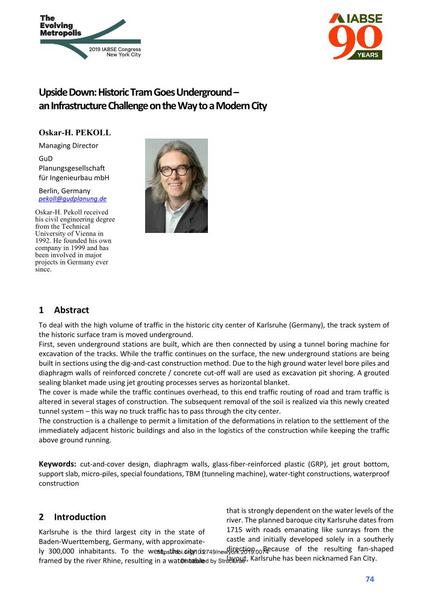Upside Down: Historic Tram Goes Underground – an Infrastructure Challenge on the Way to a Modern City

|
|
|||||||||||
Détails bibliographiques
| Auteur(s): |
Oskar-H. Pekoll
(GuD Planungsgesellschaft für Ingenieurbau mbH)
|
||||
|---|---|---|---|---|---|
| Médium: | papier de conférence | ||||
| Langue(s): | anglais | ||||
| Conférence: | IABSE Congress: The Evolving Metropolis, New York, NY, USA, 4-6 September 2019 | ||||
| Publié dans: | The Evolving Metropolis | ||||
|
|||||
| Page(s): | 74-81 | ||||
| Nombre total de pages (du PDF): | 8 | ||||
| DOI: | 10.2749/newyork.2019.0074 | ||||
| Abstrait: |
To deal with the high volume of traffic in the historic city center of Karlsruhe (Germany), the track system of the historic surface tram is moved underground. First, seven underground stations are built, which are then connected by using a tunnel boring machine for excavation of the tracks. While the traffic continues on the surface, the new underground stations are being built in sections using the dig-and-cast construction method. Due to the high ground water level bore piles and diaphragm walls of reinforced concrete / concrete cut-off wall are used as excavation pit shoring. A grouted sealing blanket made using jet grouting processes serves as horizontal blanket. The cover is made while the traffic continues overhead, to this end traffic routing of road and tram traffic is altered in several stages of construction. The subsequent removal of the soil is realized via this newly created tunnel system – this way no truck traffic has to pass through the city center. The construction is a challenge to permit a limitation of the deformations in relation to the settlement of the immediately adjacent historic buildings and also in the logistics of the construction while keeping the traffic above ground running. |
||||
